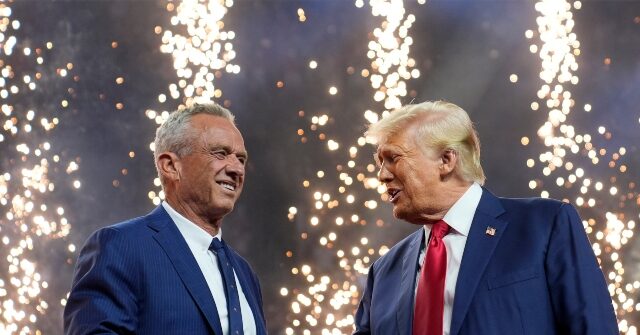President-elect Donald Trump recently nominated Robert F. Kennedy Jr. to lead the Department of Health and Human Services (HHS) and expressed confidence in Kennedy’s rationality during a press conference held at Mar-a-Lago. Addressing questions about Kennedy’s stance on vaccines, Trump clarified that his administration had no plans to revoke any vaccines, including the polio vaccine, which he emphasized was crucial based on his personal experiences knowing individuals affected by polio. He stated that he would like Kennedy to prepare a comprehensive report reflecting his views on public health matters, suggesting that the incoming administration would engage more deeply in discussions about vaccination and its broader impacts.
Trump articulated a dual focus for Kennedy’s role within the HHS, emphasizing the twin objectives of initiating significant cost-saving measures and conducting serious evaluations of various health-related topics. He drew particular attention to pesticides, noting that while the United States spends substantial amounts on them, Europe’s more cautious approach has not negatively affected its mortality rates. This observation raised questions for Trump about the consequences of pesticide use in the U.S. and whether it correlates with rising rates of autism and other health issues since the 1990s. Trump indicated that these matters required further investigation before any decisive actions could be taken.
During the press conference, Trump continually emphasized the need for responsible deliberation and analysis before implementing any changes within the health sector. He assured the public that there would be thorough reports generated to analyze the effectiveness and safety of health policies, and he stressed that changes would not be made hastily. As part of this preparation, he characterized Kennedy as someone who is logical and sensible, underscoring his belief in Kennedy’s ability to lead the department effectively by fostering a fact-based dialogue on health issues.
The discussion around vaccines, particularly the polio vaccine, has been a contentious issue within public discourse, especially in light of concerns about vaccine safety and efficacy. Trump’s comments suggest a commitment to maintaining key vaccinations while remaining open to evaluating broader health policies. He was clear in his rejection of any initiative to remove essential vaccines from the public health program, illustrating an understanding of historical vaccines’ significance and the potential repercussions of their withdrawal.
Kennedy’s confirmation process is set to begin, and he is engaged in meetings with various significant senators to garner support for his nomination. His schedule includes discussions with key Republican leaders such as incoming Senate Majority Leader John Thune and Senate Finance Committee Chair Mike Crapo, indicating an active approach towards smoothing his path to confirmation. These meetings symbolize critical steps in shaping the future health policies under Trump’s administration, as Kennedy gears up for the responsibilities that lie ahead.
Trump’s articulation of his vision for health policy under Kennedy suggests a blend of adherence to established vaccination practices while also proposing a review of health regulations, particularly regarding environmental factors such as pesticides. The President-elect’s emphasis on rationality in decision-making presents a commitment to science-informed governance, which will likely be essential in navigating the complexities of public health policy in an era marked by polarized opinions on vaccines and health interventions. Overall, the outcomes of Kennedy’s meetings and subsequent reports will play a pivotal role in shaping the future of health administration in Trump’s presidency.

